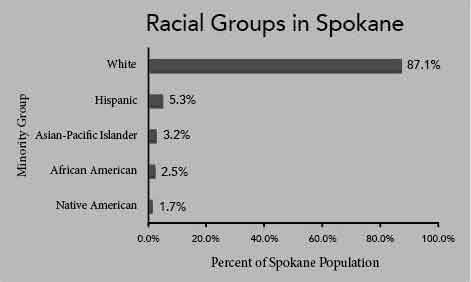Eastern professor, SPD captain study discrimination

Information provided by Officer Contacts with Civilians and Race in the City of Spokane: A Quantitative Analysis.
April 17, 2015
EWU’s Ed Byrnes, Ph.D., teamed up with Captain Brad Arleth of the Spokane Police Department to gather and study data on officer initiated contacts with civilians. The goal was to determine whether or not there was racial discrimination within the SPD.
Data was gathered from 7,021 stops between March and August of 2014. Every time officers initiated an in-person contact that either did or was likely to involve an officer detaining a civilian, they used an electronic instrument to report the nature of the contact as well information such as the race, age and gender of the person or persons involved.
The data showed the rate of contact between officers and persons of African American and Native American race were disproportionate beyond what a level of chance would allow.
The report stated “African Americans are 2.5 percent of the city of Spokane population and were 6.1 percent of contacts. Native Americans are 1.7 percent of the city population and were 3 percent of contacts.”
The rates of searches or arrests were racially disproportionate as well, but the report stated it appears the disproportionality in initial contacts “is what drives the subsequent disproportionalities in searches and arrests.”
According to the report, 632 arrests were made and 570 searches were conducted throughout the period of the study. African Americans were 10.9 percent of civilians arrested and 10.4 percent of those searched. Native Americans were 7.6 percent of civilians arrested and 8.4 percent of those searched.
“The rates of arrests are disproportional, but the reasons for those arrests or searches are not,” said Byrnes. “There is no evidence of bias in the reasons.”
What the study could not conclude was why the rates of initial contact were disproportionate in terms of race. Police Chief Frank Straub said in an interview with Rachel Alexander of The Spokesman-Review, “What we’re trying to figure out is what brings those people to the police and what brings the police to those people.”
The report could not conclude whether there were any racial disproportionality in the use of force by the SPD. There were only 22 incidents in which force was used, which is not enough data to make any solid conclusions.
Rachel Dolezal, Africana Studies professor at EWU and chairwoman of the police ombudsman commission, said she believes that while the study is certainly helpful, it is not the only thing that should be taken into account.
“One kind of danger is that people will take that report and see it as being the answer, you know, the data that will prove there is or isn’t racism,” said Dolezal. “I feel like the public needs to welcome the Byrnes report as, again, a valid angle on the conversation, but again, not something that should eliminate other perspectives.”
The study is ongoing with a second report scheduled to be released in October that will provide answers to further questions. Byrnes noted the SPD “has been more open than I’ve ever known them to be before.”







